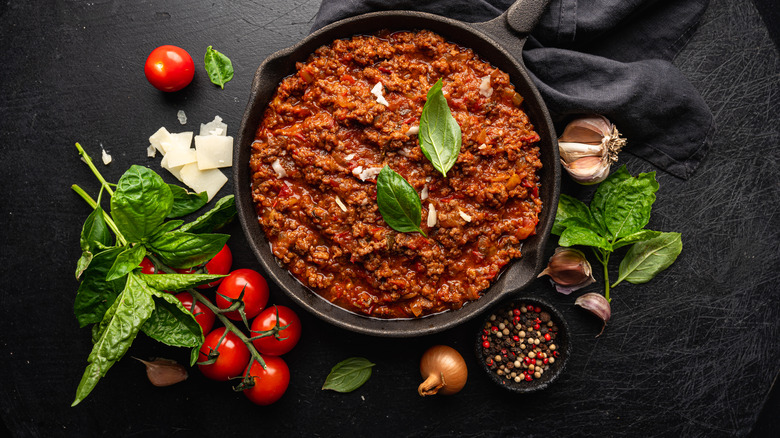Does Cooking With Wine Corks Really Make Food More Tender?
Every so often, a food hack comes along that gives us pause. The newest trend that has tongues wagging and some people scratching their heads in wonder is whether cooking with cork can tenderize foods, particularly meat, and octopus. It seems farfetched, but plenty of proponents of this cooking method swear adding a cork leaves your foods tender.
Recently, Brooklyn Beckham, son of Victoria and David Beckham, shared photos on Instagram of him cooking Bolognese sauce with a cork floating in the pot, which he later explained was included to tenderize the meat. The post ignited a fierce debate with many commentators criticizing the cork's use while others' came to Beckham's defense.
Believers often cite this article from 2016 by the late food writer Doris Reynolds about using these buoyant stoppers in cooking. Reynolds shared that it is well-known and common practice to use corks to help tenderize octopus as it cooks. While Reynolds validated the practice, explaining that Mario Batali swears by the cork method, neither Reynolds nor other pro-cork folks cite any science back up the claim.
So which is it? Is this just an old wives' tale that has duped the culinary curious — including well-known chefs and knowledgeable food writers — with promises of soft, succulent bites of meat for decades, or does this hack really have any science to back it up?
Wine corks have a purpose, but not tenderizing meat
While there haven't been scientific studies about cooking with this sponge-like substance to prove or disprove its ability to tenderize meat, a round-up of expert advice makes it clear that wine corks won't tenderize meat; in fact, the practice was started for an entirely unrelated purpose.
In a New York Times article, Harold McGee who writes about the intersection of food and science said there is no science behind using cork to tenderize meat. Through his own experimentation when making octopus, McGee concluded that cooks should keep the cork in their wine bottles. The only method he endorsed for tenderizing octopus was brining. For those who think there are tannins in the cork that help the tenderization process, think again. The Los Angeles Times labeled the tannins theory a "misconception." The outlet conceded that the cork might impart some flavor, but said the only way to tenderize meat is by cooking or pounding it.
So why did people start dropping corks in their cooking pots at all? Italian chef Barbara Pollastrini explained to Insider that the original intent of cooking octopus with a cork was simply to help fishermen locate them in the giant cooking pots they are sold from on the streets of Southern Italy. Just as buoys help the fisherman locate their nets and traps in the ocean, a wine cork tied to an octopus with string insures the most important part of the dish isn't lost in the cooking process.
Since most of us are working with much smaller pots, we think we can all ditch the wine corks from now on.

